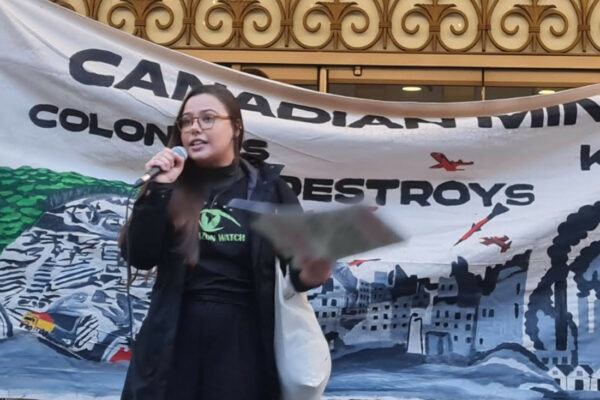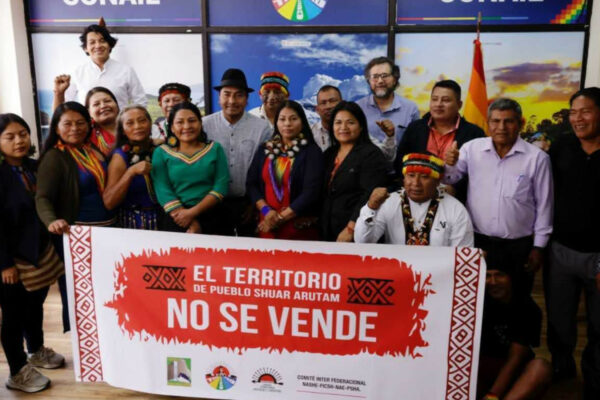Altamira, Brazil – At the second day of the gathering “In Defense of the Xingu: Against Belo Monte!”, impassioned, steadfast speeches were given amidst colorful feather head dresses, and painted bodies and faces. Roughly 500 participants – indigenous people and riverbank dwellers, local farmers and social leaders – are meeting to discuss the grave environmental and social impacts of large infrastructure projects by the Brazilian government.
Specialists discussed their analysis of major developments in the Brazilian Amazon, such as the hydroelectric Belo Monte and Jirau dams; and the construction of highways, like the trans-Amazonian 163 linking Cuiabá (MT) to Santarem (PA).
The first round of discussions was chaired by Marcos Apurinã, the Executive Director of the Alliance of Indigenous Organizations in the Brazilian Amazon (COIAB); with the participation of professors from the Federal University of Pará (UFPA), Hermes Fonseca de Medeiros and Jose Herrera; along with William Carvalho, of the Federation of Organizations for Social and Educational Assistance (FASE).
As Professor De Medeiros noted, “Although it is impossible to measure fully the real impact of large projects like Belo Monte, it is important to be clear about what we’re talking about. Thousands of families will become homeless. They will go without the natural resources that guarantee their survival, most importantly water. We must ask for public support to stop these aggressions against the environment and the traditional cultures of these people.”
Human Rights Violations
In every speech participants underscored one vital point: the fight is not only against Belo Monte, which the government has insisted on building for over 30 years. The fight is against any state project that does not respect human rights. “When the government announces it will undertake large infrastructural projects, it is not thinking about what is best for the people. It is serving big business, big capital,” said Moises Ribeiro of the Movement of Dam-Affected Peoples (MAB).
“The government has money to build its huge projects,” Ribeiro continued. Therefore, its claims that there is no money to invest in public health, better living conditions for river dwellers or education for the indigenous, are simply inexcusable.
Reckless Spending
William Carvalho agrees with Ribeiro. “The government gives billions of reais to contractors, while many indigenous people die of hunger and a lack of health care and sanitation. Our campaign, therefore, is not only against Belo Monte, it is broader and more definitive. It is a campaign that urges public opinion to denounce the damage the federal government is planning to inflict on Brazil, against the Amazon and against the Brazilian people.”
Indigenous Indignation
After comments by panelists, participants had the opportunity to speak out for themselves. For Kretã Kainging, leader of the Kaingang people and the Voice of Indigenous Peoples of the South (Arpinsul), Belo Monte is business as usual. A crime against the indigenous of Brazil, Belo Monte is like other projects already completed by the state, such as the construction of the Itaipu binational hydroelectric plant, built along the border between Brazil and Paraguay. “What kind of progress does the government want for us? We strongly believed in this government. They wanted to get in power and they did. They wanted to pass laws and did so, as well. Many of these same laws, however, go against the rights of indigenous peoples. Many of us put these people in power, and now they turn against us,” Kainging stated.
For Marcos Apurinã, the major concern is who will maintain the traditions of indigenous peoples. “Money is not worth more than nature, than our traditions! So I would say to all indigenous people, we will not sell our blood – our children – for big business. We will fight. We will never give up!”
Rises in Crime and Prostitution
José Luiz of South Rondônia added that the damage caused by hydroelectric dams does not only affect the indigenous, but society in general. “Social, economic and cultural damage goes hand-in-hand with construction. Look at the state of Rondônia and you readily see the increase in violence and prostitution. Altamira runs a great risk of following in Rondônia’s footsteps. And we cannot allow that to happen.”













